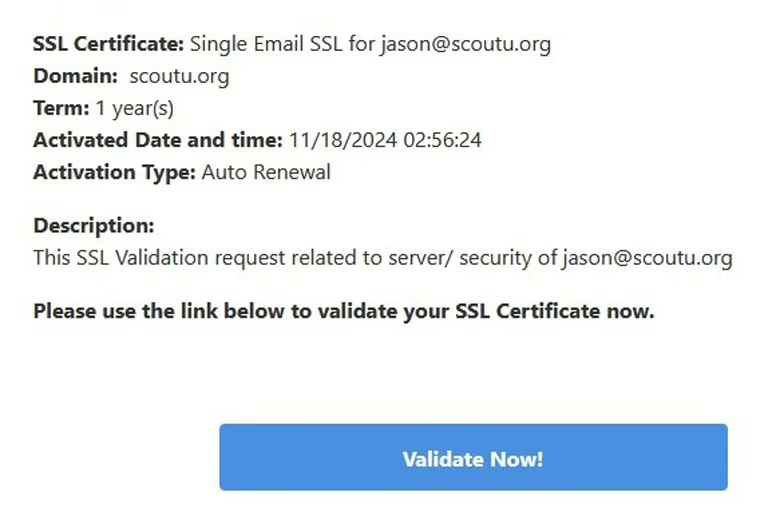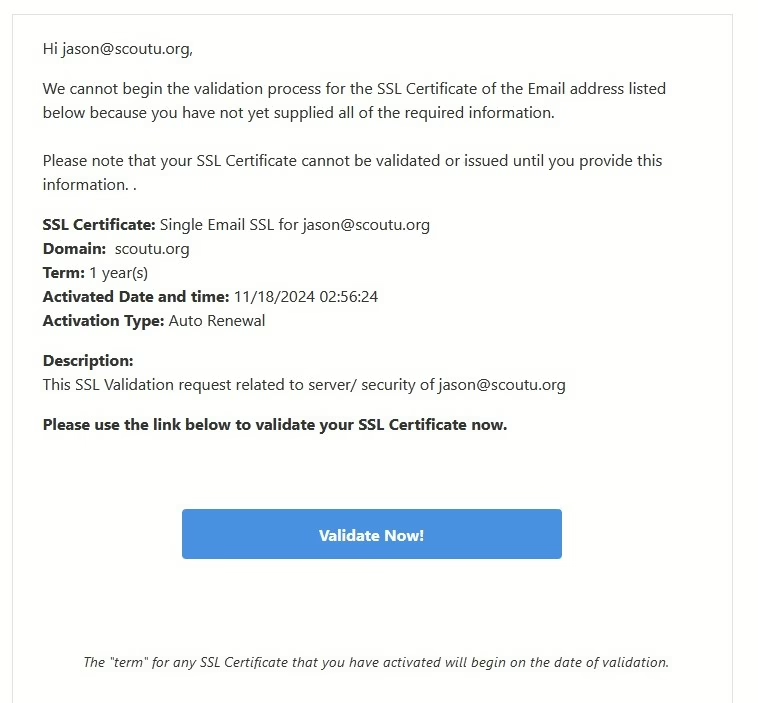SSL validation email scam attempts are on the rise—and we recently caught one targeting one of our clients. It looked official. It used urgent language. It included a link to “validate” the certificate.
But it wasn’t legitimate.
This was a phishing attack, designed to steal login credentials by mimicking a real SSL certificate notification. And unfortunately, it’s becoming more common.
We’re sharing this real-world example—used with permission from Jason at ScoutU.org—so you can see how these scams work, and how to stay safe.
The SSL Fake Email: What It Looked Like
Click on the image to enlarge. At first glance, it appears to be a routine certificate notice. But on closer inspection, the red flags start piling up.
After clicking the “Validate Now” link (we don’t recommend this), the page led to a fake cPanel login screen—a classic phishing trap designed to harvest credentials.
Glimmernet doesn’t use cPanel. If you see a message asking you to log in to cPanel, and you’re a Glimmernet client—that’s your first warning sign.
Used with permission from ScoutU
Why the SSL Validation Email Scam Works So Well
- SSL certificates really do expire
- Expired SSLs cause scary browser warnings that say the site is “not secure”
- When real SSL certificates expire, visitors may not be able to access your site at all—which can lead to lost sales, reduced credibility, and frustrated users
- Most people don’t fully understand what SSL validation means
- The emails look urgent and technical, which makes them easy to fall for
How to Spot an SSL Validation Email Scam Before It’s Too Late
- The email says “Single Email SSL” or another vague, unfamiliar product name
- The domain in the link doesn’t match your host or registrar
- The link takes you to a fake login screen (often cPanel)
- The wording is slightly off: extra spaces, missing punctuation, or clunky phrasing
- You weren’t expecting an SSL validation message
- The product doesn’t make sense — SSL certificates typically protect websites, not email addresses. If it references your “email SSL” but you didn’t purchase one, that’s a red flag.
If You’re a Glimmernet Client
Here’s the most important thing to know: If you host with Glimmernet, you should not receive SSL renewal or validation emails directly.
We manage SSL certificates internally through our network engineering team. Unless you’ve purchased a custom SSL certificate through a third-party provider, you won’t need to validate anything manually. In either case we’ll monitor your SSL expiration dates via our UptimeVision™ solution, so you’ll always know if and when you need to take any action.
If you receive an email like this:
- Don’t click any links
- Don’t enter any login info
- Forward it to support@glimmernet.com or open a ticket at https://support.glimmernet.com
Jason did exactly that—and avoided a serious security breach.
Not Hosting with Glimmernet?
It’s possible you may receive legitimate SSL renewal messages if your host doesn’t manage certificates for you.
That’s why scammers love this angle—they know it’s hard to tell the difference.
If in doubt, don’t guess. Contact your hosting provider directly, not through the links in the email. If your host doesn’t offer fully managed security and SSL coverage, it might be time to upgrade.
Frequently Asked Questions regarding the SSL Validation Scam
How do I know if an SSL validation email is real?
Check the sender’s domain, don’t click suspicious links, and never enter login info on a page you didn’t expect. When in doubt, contact your host directly.
Does Glimmernet send SSL validation emails?
No. We manage standard SSL certificates automatically. If you’ve purchased a custom certificate and need to approve it, we’ll let you know through our support system—not a random third-party email.
What happens if I fall for it?
If you entered credentials, assume they were stolen. Immediately reset your passwords and contact your hosting provider to scan for malware, backdoors, or DNS changes.
Pro tip: Use a password manager to ensure every account has a strong, unique password. That way, if one login is compromised, it can’t be reused to access your other accounts.
(We’ll be covering password managers in an upcoming post—stay tuned.)
Final Thoughts on Avoiding the SSL Validation Email Scam
Scams like these are designed to trick smart people with technical-sounding language and artificial urgency. But you don’t have to go it alone.
If you receive a suspicious message about SSL validation, hosting credentials, or anything else that smells phishy:
📨 Email us at support@glimmernet.com
🔗 Or visit: https://support.glimmernet.com
It’s always safer to ask.








0 Comments